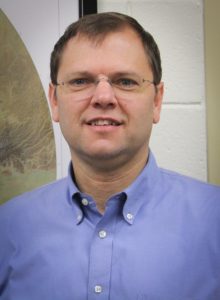Joel Kostka Elected American Academy of Microbiology Fellow
– JULY 18, 2019
The Gulf of Mexico Research Initiative (GoMRI) congratulates Dr. Joel Kostka on his election as a 2019 American Academy of Microbiology (AAM) Fellow. The AAM is an honorific leadership group within the American Society for Microbiology (ASM), the world’s oldest and largest life science organization.
The AAM recognizes scientists for outstanding contributions to microbiology and provides microbiological expertise in the service of science and the public. AAM Fellows are elected through a selective peer-review process, based on scientific achievement and original contributions that have advanced microbiology. Kostka recently received another recognition of his microbiology contributions, the ASM 2018 Distinguished Lecturer.
Kostka is a Professor and Associate Chair of Research in the Schools of Biological Sciences and Earth and Atmospheric Sciences at the Georgia Institute of Technology (Georgia Tech). His research interests include environmental microbiology especially related to biodegradation and climate change, microbial genetics and ecology, geomicrobiology, and biogeochemistry. Kostka has received research grants from the U.S. Department of Energy (DOE), GoMRI, U.S. Department of the Army, National Science Foundation (NSF), Florida Institute of Oceanography, NOAA Sea Grant College Program, and the Northern Gulf Institute (a NOAA Cooperative Institute), He has authored or co-authored over 110 peer-reviewed publications.
Kostka has been studying the microbial response to the Deepwater Horizon oil spill since 2010, and his lab has generated an extensive genetic sequence database and culture collection of native microorganisms from oil-contaminated sediments (some of which is publicly available at the Gulf of Mexico Research Initiative Information and Data Cooperative or GRIIDC). He has co-authored sixteen peer-reviewed publications, two book chapters, and 85 conference presentations as a result of his involvement as Co-Principal Investigator for these GoMRI-funded projects:
- The Center for the Integrated Modeling and Analysis of Gulf Ecosystems (C-IMAGE-II and C-IMAGE-III)
- The Deepsea to Coast Connectivity in the Eastern Gulf of Mexico (Deep-C) consortium
- A systems approach to improve predictions of biodegradation and ecosystem recovery in coastal marine sediments impacted by oil spill
- Expanding Contaminated Sediment Sampling in Gulf Coast Beaches
- Penetration, Accumulation and Degradation of BP DWH Oil in Florida Sandy Beaches
- Assessing the Impact of the Deepwater Horizon Oil Spill on Sediments and Benthic Communities on the West Florida Shelf and Slope.
- Deepwater Horizon Oil Deposition in Gulf of Mexico Beaches Phase 2: Recovery of the Beach Sedimentary Environment
- Impact of Crude Oil on Coastal and Ocean Environments of the West Florida Shelf and Big Bend Region from the Shoreline to the Continental Shelf Edge
Kostka received his Ph.D. in Marine Science at the University of Delaware; a M.S. degree in Marine Biology at the University of Charleston, South Carolina; and a B.S. degree in Biology at Western Illinois University, Macomb. Prior to teaching at Georgia Tech, Kostka was a professor at Florida State University and Skidaway Institute of Oceanography; a visiting scientist at the Max Planck Institute for Marine Microbiology, Bremen, Germany; and an NSF Postdoctoral Fellow in Marine Biotechnology at the University of Wisconsin. During this time, Kostka received the NSF Postdoctoral Fellowship Award in Marine Biotechnology, the DOE Ralph E. Powe Junior Faculty Enhancement Award, and The Georgia Power Professor of Excellence honor.
Kostka is advising or has advised fifteen graduate and seven post-doctoral students and has received the Florida State University Developing Scholar Award and the Georgia Tech College of Science Mentor Award
Other leadership roles include American Society of Microbiology Chair for Division N Microbial Ecology and Editor and Editorial Board Member for Applied and Environmental Microbiology. Kostka served on various science panels including the Gulf Research Program; the NSF Directorate for Biological Sciences; the DOE Office of Science; the AAAS/ King Abdulaziz City for Science and Technology Environmental Pollution Program; U.S. Environmental Protection Agency Environmental Impact and Mitigation of Oil Spills program; and the DOE Genome Science program.
By Nilde Maggie Dannreuther. Contact maggied@ngi.msstate.edu with questions or comments.
************
The Gulf of Mexico Research Initiative (GoMRI) is a 10-year independent research program established to study the effect, and the potential associated impact, of hydrocarbon releases on the environment and public health, as well as to develop improved spill mitigation, oil detection, characterization and remediation technologies. An independent and academic 20-member Research Board makes the funding and research direction decisions to ensure the intellectual quality, effectiveness and academic independence of the GoMRI research. All research data, findings and publications will be made publicly available. The program was established through a $500 million financial commitment from BP. For more information, visit https://gulfresearchinitiative.org/.
© Copyright 2010-2019 Gulf of Mexico Research Initiative (GoMRI) – All Rights Reserved. Redistribution is encouraged with acknowledgement to the Gulf of Mexico Research Initiative (GoMRI). Please credit images and/or videos as done in each article. Questions? Contact web-content editor Nilde “Maggie” Dannreuther, Northern Gulf Institute, Mississippi State University (maggied@ngi.msstate.edu).






